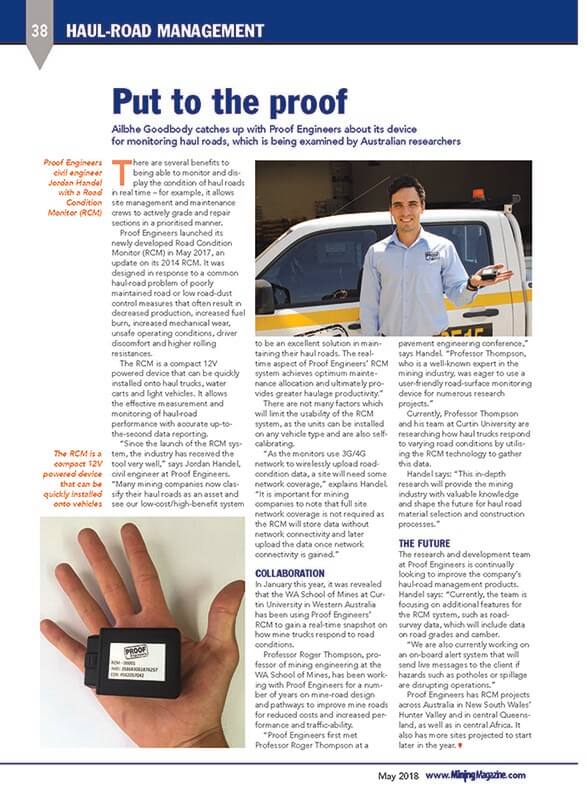Put to the Proof (Mining Magazine)
1 May 2018 - Dust Control Efficiency, dust monitoring, haul road dust monitoring, haul road improvement, mobile dust monitor, mobile dust monitoring, pit performance, road condition monitoring -

Ailbhe Goodbody catches up with Proof Engineers about its device for monitoring haul roads, which is being examined by Australian researchers.
There are several benefits to being able to monitor and display the condition of haul roads in real time - for example, it allows site management and maintenance crews to actively grade and repair sections in a prioritised manner.
Proof Engineers launched its newly developed Road Condition Monitor (RCM) in May 2017, an update on its 2014 RCM. It was designed in response to a common haul road problem of poorly maintained road or low road-dust control measures that often result in decreased production, increased fuel burn, increased mechanical wear, unsafe operating conditions, driver discomfort and higher rolling resistances.
The RCM is a compact 12V powered device that can be quickly installed onto haul trucks, water carts and light vehicles. It allows the effective measurement and monitoring of haul-road performance with accurate up-to-the-second data reporting.
"Since the launch of the RCM system, the industry has received the tool very well," says Jordan Handel, civil engineer at Proof Engineers. "Many mining companies now classify their haul roads as an asset and see our low-cost/high-benefit system to be an excellent solution in maintaining their haul roads. The real-time aspect of Proof Engineers' RCM system achieves optimum maintenance allocation and ultimately provides greater haulage productivity."
There are not many factors which will limit the usability of the RCM system, as the units can be installed on any vehicle type and are also self-calibrating.
"As the monitors use 3G/4G network to wirelessly upload road-condition data, a site will need some network coverage," explains Handel. "It is important for mining companies to note that full site network coverage is not required as the RCM will store data without network connectivity and later upload the data once network connectivity is gained."
Collaboration
In January this year, it was revealed that the WA School of Mines at Curtin University in Western Australia has been using Proof Engineers' RCM to gain a real-time snapshot on how mine trucks respond to road conditions.
Professor Roger Thompson, professor of mining engineering at the WA School of Mines, has been working with Proof Engineers for a number of years on mine-road design and pathways to improce mine roads for reduced costs and increased performance and traffic-ability.
"Proof Engineers first met Professor Roger Thompson at a pavement engineering conference," says Handel. "Professor Thompson, who is a well-known expert in the mining industry, was eager to use a user-friendly road-surface monitoring device for numerous research projects."
Currently, Professor Thompson and his team at Curtin University are researching how haul trucks respond to varying road conditions by utilising the RCM technology to gather this data.
Handel says: "This in-depth research will provide the mining industry with valuable knowledge and shape the future for haul road material selection and construction processes."
The future
The research and development team at Proof Engineers is continually looking to improve the company's haul-road management products. Handel says: "Currently, the team is focusing on additional features for the RM system, such as road-survey data, which will include data on road grades and camber.
"We are also currently working on an on-board alert system that will send live messages to the client if hazards such as potholes or spillage are disrupting operations."
Proof Engineers has RCM projects across Australia in New South Wales' Hunter Valley and in central Queensland, as well as in central Africa. It also has more sites projected to start later in the year.

